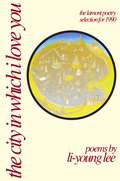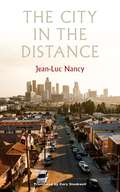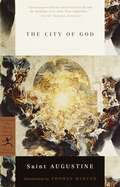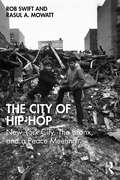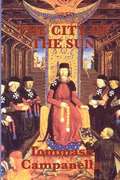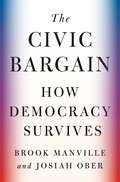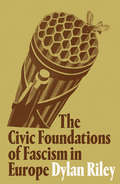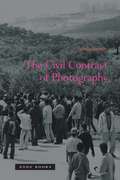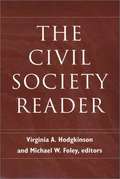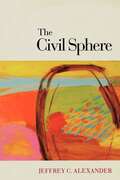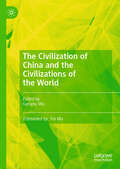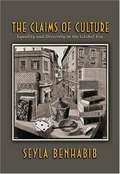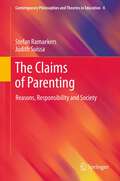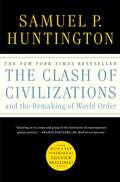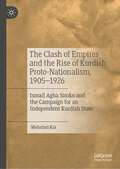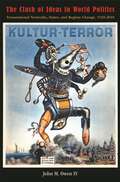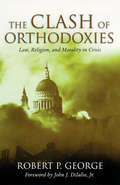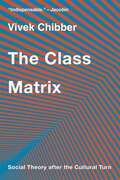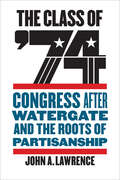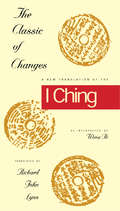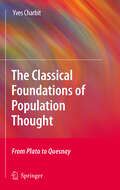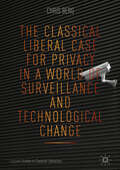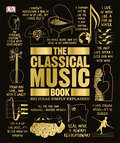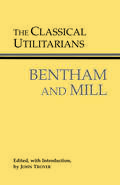- Table View
- List View
The City in Which I Love You (American Poets Continuum)
by Li-Young LeeContentsI.Furious VersionisII.The InterrogationThis Hour And What Is DeadArise, Go DownMy Father, In Heaven, Is Reading Out LoudFor A New Citizen Of These United StatesWith RuinsIII.This Room And Everything In ItThe City In Which I Love YouIV.The WaitingA StoryGoodnightYou Must SingHere I AmA Final ThingV.The Cleaving
The City in the Distance
by Jean-Luc NancyFINALIST, 38th ANNUAL FRENCH-AMERICAN FOUNDATION TRANSLATION PRIZEExploring the ever-changing philosophy of city life with Jean-Luc NancyIn The City in the Distance, Jean-Luc Nancy embarks on nothing less than a philosophy of the city. Drawing on his widely discussed accounts of sense and of the fraught question of community, Nancy views the city as the site of a disposition that is constantly undergoing metamorphoses.Far from an abstract account, Nancy attends in the most concrete way possible to the workings of a city not typically taken as paradigmatic, Los Angeles. As Jean-Christophe Bailly suggests in his foreword, Nancy joins Walter Benjamin in thinking the city not from an external vantage point, but on its own terms.
The City of God: A Christian Classic Work By St. Augustine Of Hippo (Modern Library Classics)
by Saint AugustineWritten in the early 5th century by Augustine of Hippo, who later became a Doctor of the Church, this large theological work provided an articulate defense of Christianity when it was being held culpable for the shocking sack of Rome that had occurred just a few years before. It outlines a citizenship that goes beyond the worldly, the political, and the self-centered, instead focusing on a place where the inhabitants are devout, God-focused, and seeking grace. In examining history with a clear perception of good and evil, Augustine was in effect interpreting human actions in relation to eternity. He contrasts earthly and heavenly cities to great effect, in addition to inspecting pagan religions, Greek philosophers like Plato, and the Bible. Just as it influenced the people of the author's own time, "The City of God" is still a powerful Christian text to this day and considered a foundational work of Christianity.
The City of Hip-Hop: New York City, The Bronx, and a Peace Meeting
by Rob Swift Rasul A. MowattThe City of Hip-Hop positions a unique conceptualization of the history of Hip-Hop, that it was a combination of forces that produced the environment for Hip-Hop to specifically grow in the geographies of New York City and its boroughs. This book argues it was the political forces of the 1970s combined with the economic forces of free market capitalism and privatization of public services, neoliberalism, and the social forces of the deindustrialization of major cities and displacement of populations that led the cultural creation of the “Boogie Down” Bronx. The City of Hip-Hop shows how Hip-Hop is a socio-political reaction that created an alternate reality with a geographic specificity, and it is the interplay with those forces that nurtured it to become the culture force that we know it today in New York, Philadelphia, Boston, Los Angeles, Chicago, London, Manchester, Liverpool, Berlin, São Paulo, Tokyo, Washington D.C., Seattle, Paris, Houston, Dallas, Miami, Atlanta, Detroit, Toronto, Cleveland, Johannesburg, Barcelona, Belfast, Gaza City, and elsewhere. Once those of us as fans of the culture zoom out to see such a bigger picture, a much-needed criticism and retelling of the culture and art of Hip-Hop emerges as our understanding.This book is essential for preservers of the culture, students, scholars, and general readers interested in urban planning, urban design, urban geography, place-making, American Studies, Cultural Studies, Black Studies, and Latin American Studies.
The City of Sun
by Tommaso CampanellaThe City of the Sun is a dialogue between "a Grandmaster of the Knights Hospitaller and a Genoese Sea-Captain." The book describes a theocratic society where goods, women, and children are held in common. It also resembles the City of Adocentyn in the Picatrix, an Arabic guide to magical town planning. In the final part of the work, Campanella prophesies-- in the veiled language of astrology-- that the Spanish kings, in alliance with the Pope, are destined to be the instruments of a Divine Plan: the final victory of the True Faith and its diffusion in the whole world.
The Civic Bargain: How Democracy Survives
by Josiah Ober Brook ManvilleA powerful case for democracy and how it can adapt and survive—if we want it toIs democracy in trouble, perhaps even dying? Pundits say so, and polls show that most Americans believe that their country’s system of governance is being “tested” or is “under attack.” But is the future of democracy necessarily so dire? In The Civic Bargain, Brook Manville and Josiah Ober push back against the prevailing pessimism about the fate of democracy around the world. Instead of an epitaph for democracy, they offer a guide for democratic renewal, calling on citizens to recommit to a “civic bargain” with one another to guarantee civic rights of freedom, equality, and dignity. That bargain also requires them to fulfill the duties of democratic citizenship: governing themselves with no “boss” except one another, embracing compromise, treating each other as civic friends, and investing in civic education for each rising generation.Manville and Ober trace the long progression toward self-government through four key moments in democracy’s history: Classical Athens, Republican Rome, Great Britain’s constitutional monarchy, and America’s founding. Comparing what worked and what failed in each case, they draw out lessons for how modern democracies can survive and thrive. Manville and Ober show that democracy isn’t about getting everything we want; it’s about agreeing on a shared framework for pursuing our often conflicting aims. Crucially, citizens need to be able to compromise, and must not treat one another as political enemies. And we must accept imperfection; democracy is never finished but evolves and renews itself continually. As long as the civic bargain is maintained—through deliberation, bargaining, and compromise—democracy will live.
The Civic Foundations of Fascism in Europe: Italy, Spain, And Romania, 1870-1945
by Dylan RileyA historical look at the emergence of fascism in EuropeDrawing on a Gramscian theoretical perspective and development a systematic comparative approach, The Civic Foundations of Fascism in Europe: Italy, Spain and Romania 1870-1945 challenges the received Tocquevillian consensus on authoritarianism by arguing that fascist regimes, just like mass democracies, depended on well-organized, rather than weak and atomized, civil societies. In making this argument the book focuses on three crucial cases of inter-war authoritarianism: Italy, Spain and Romania, selected because they are all counter-intuitive from the perspective of established explanations, while usefully demonstrating the range of fascist outcomes in interwar Europe. Civic Foundations argues that, in all three cases, fascism emerged because the rapid development of voluntary associations combined with weakly developed political parties among the dominant class thus creating a crisis of hegemony. Riley then traces the specific form that this crisis took depending on the form of civil society development (autonomous- as in Italy, elite dominated as in Spain, or state dominated as in Romania) in the nineteenth century.
The Civil Contract of Photography
by Ariella AzoulayIn this groundbreaking work, Ariella Azoulay thoroughly revises our understanding of the ethical status of photography. It must, she insists, be understood in its inseparability from the many catastrophes of recent history. She argues that photography is a particular set of relations between individuals and the powers that govern them and, at the same time, a form of relations among equals that constrains that power. Anyone, even a stateless person, who addresses others through photographs or occupies the position of a photograph’s addressee, is or can become a member of the citizenry of photography.The crucial arguments of the book concern two groups that have been rendered invisible by their state of exception: the Palestinian noncitizens of Israel and women in Western societies. Azoulay’s leading question is: Under what legal, political, or cultural conditions does it become possible to see and show disaster that befalls those with flawed citizenship in a state of exception? The Civil Contract of Photography is an essential work for anyone seeking to understand the disasters of recent history and the consequences of how they and their victims are represented.
The Civil Society Reader
by Virginia A. Hodgkinson Michael W. FoleyVirginia Hodgkinson and Michael Foley have assembled a definitive collection of 24 readings from the writings of thinkers who have shaped the civil society tradition in Western political thought through the ages. Their clear, intelligent introduction establishes a framework for understanding the complex and perennial debate over conditions of citizenship and the character of the good society. The text moves from the origins of the debate, a consideration of Aristotle's vision of political order, the polis, through the "civic republicanism" of Machiavelli and his English and American followers. It also discusses Hobbes's and Montesquieu's conceptions of natural law and the social contract, Immanuel Kant and Adam Ferguson and the emergence of the modern notion of civil society in the late 18th century, and the thoughts and theories of Hegel, Marx, and Gramsci. Contemporary discussion of civil society in the US started with Berger, Newhaus, and others who addressed the role of intermediary institutions and the political process. In the 1980s, especially as the Cold War ended, writing on civil society exploded. The anthology tracks the key works that have influenced public dialogue in this era. Chapters by Walzer, Barber, Putnam, Almond and Verba, Shils, and others describe the role of association in civil society and its role in democratic governance. As the concept of "civil society" grows ever more prominent in academic and public considerations of politics and political organization, citizen participation, political alienation, voluntary organizations, privatization, government deregulation, and "faith-based" charities, Civil Society: A Reader is the essential historical and theoretical text.
The Civil Sphere
by Jeffrey C. AlexanderWhat binds societies together and how can these social orders be structured in a fair way? Jeffrey C. Alexander's masterful work, The Civil Sphere, addresses this central paradox of modern life. Feelings for others--the solidarity that is ignored or underplayed by theories of power or self-interest--are at the heart of this novel inquiry into the meeting place between normative theories of what we think we should do and empirical studies of who we actually are. Solidarity, Alexander demonstrates, creates inclusive and exclusive social structures and shows how they can be repaired. It is not perfect, it is not absolute, and the horrors which occur in its lapses have been seen all too frequently in the forms of discrimination, genocide, and war. Despite its worldly flaws and contradictions, however, solidarity and the project of civil society remain our best hope: the antidote to every divisive institution, every unfair distribution, every abusive and dominating hierarchy. This grand, sweeping statement and rigorous empirical investigation is a major contribution to our thinking about the real but ideal world in which we all reside.
The Civilization of China and the Civilizations of the World
by Genyou WuThis book talks about “Human Spirit and its Manifestations: A ‘Civilizational’ Perspective”, “Image and Expectations: China from the Perspective of the ‘Other’ Lecture Series”, “Civilization Communication and Mutual Enrichment”, and “Civilizational Problems: A Cavalier Perspective”. Civilization is a kind of spiritual achievements with a holistic feature that is structural but not easy to see thoroughly in culture. This determines that “dialogue among civilizations” is not only a continuous and holistic cultural exchange activity, but also a material and spiritual exchange activity in different fields. With the growth of international peace power represented by China, the cultural exchanges and mutual learning activities among all ethnic groups in the world will be further promoted at a new height and breadth. The academic research on “dialogue among civilizations” followed in this book will also contribute to the arrival of this era. This book is suitable for general readers and scholars who are interested in Chinese culture, Chinese civilization, cultural exchanges, and mutual enrichment.
The Claims of Culture: Equality and Diversity in the Global Era
by Seyla BenhabibHow can liberal democracy best be realized in a world fraught with conflicting new forms of identity politics and intensifying conflicts over culture? This book brings unparalleled clarity to the contemporary debate over this question. Maintaining that cultures are themselves torn by conflicts about their own boundaries, Seyla Benhabib challenges the assumption shared by many theorists and activists that cultures are clearly defined wholes. She argues that much debate--including that of "strong" multiculturalism, which sees cultures as distinct pieces of a mosaic--is dominated by this faulty belief, one with grave consequences for how we think injustices among groups should be redressed and human diversity achieved. Benhabib masterfully presents an alternative approach, developing an understanding of cultures as continually creating, re-creating, and renegotiating the imagined boundaries between "us" and "them." Drawing on contemporary cultural politics from Western Europe, Canada, and the United States, Benhabib develops a double-track model of deliberative democracy that permits maximum cultural contestation within the official public sphere as well as in and through social movements and the institutions of civil society. Agreeing with political liberals that constitutional and legal universalism should be preserved at the level of polity, she nonetheless contends that such a model is necessary to resolve multicultural conflicts. Analyzing in detail the transformation of citizenship practices in European Union countries, Benhabib concludes that flexible citizenship, certain kinds of legal pluralism and models of institutional powersharing are quite compatible with deliberative democracy, as long as they are in accord with egalitarian reciprocity, voluntary self-ascription, and freedom of exit and association. The Claims of Culture offers invaluable insight to all those, whether students or scholars, lawyers or policymakers, who strive to bridge the gap between the theory and practice of cultural politics in the twenty-first century.
The Claims of Parenting
by Stefan Ramaekers Judith SuissaMany sociological, historical and cultural stories can be and have already been told about why it is that parents in post-industrial, western societies face an often overwhelming array of advice on how to bring up their children. At the same time, there have been several philosophical treatments of the legal, moral and political issues surrounding issues of procreation, the rights of children and the duties of parents, as well as some philosophical accounts of the shifts in our underlying conceptualization of childhood and adult-child relationships. While this book partly builds on the insights of this literature, it is significantly different in that it offers a philosophically-informed discussion of the actual practical experience of being a parent, with its deliberations, judgements and dilemmas. In probing the ethical and conceptual questions suggested by the parent-child relationship, this unique volume demonstrates the irreducible philosophical richness of this relationship and thus provides an important counter-balance to the overly empirical and largely psychological focus of a great deal of "parenting" literature. Unlike other analytic work on the parent-child relationship and the educational role of parents, this work draws on first-person accounts of the day-to-day experience of being a parent in order to explore the ethical and epistemological aspects of this experience. In so doing it exposes the limitations of some of the languages within which contemporary "parenting" is conceptualized and discussed, and opens up a space for thinking about childrearing and the parent-child relationship beyond and other than in terms of the languages which dominate the ways in which we generally think about it today.
The Clash of Civilizations and the Remaking of World Order
by Samuel P. HuntingtonThe classic study of post-Cold War international relations, more relevant than ever in the post-9/11 world, with a new foreword by Zbigniew Brzezinski.Since its initial publication, The Clash of Civilizations and the Remaking of World Order has become a classic work of international relations and one of the most influential books ever written about foreign affairs. An insightful and powerful analysis of the forces driving global politics, it is as indispensable to our understanding of American foreign policy today as the day it was published. As former National Security Adviser Zbigniew Brzezinski says in his new foreword to the book, it “has earned a place on the shelf of only about a dozen or so truly enduring works that provide the quintessential insights necessary for a broad understanding of world affairs in our time.” Samuel Huntington explains how clashes between civilizations are the greatest threat to world peace but also how an international order based on civilizations is the best safeguard against war. Events since the publication of the book have proved the wisdom of that analysis. The 9/11 attacks and wars in Iraq and Afghanistan have demonstrated the threat of civilizations but have also shown how vital international cross-civilization cooperation is to restoring peace. As ideological distinctions among nations have been replaced by cultural differences, world politics has been reconfigured. Across the globe, new conflicts—and new cooperation—have replaced the old order of the Cold War era. The Clash of Civilizations and the Remaking of World Order explains how the population explosion in Muslim countries and the economic rise of East Asia are changing global politics. These developments challenge Western dominance, promote opposition to supposedly “universal” Western ideals, and intensify intercivilization conflict over such issues as nuclear proliferation, immigration, human rights, and democracy. The Muslim population surge has led to many small wars throughout Eurasia, and the rise of China could lead to a global war of civilizations. Huntington offers a strategy for the West to preserve its unique culture and emphasizes the need for people everywhere to learn to coexist in a complex, multipolar, muliticivilizational world.
The Clash of Empires and the Rise of Kurdish Proto-Nationalism, 1905–1926: Ismail Agha Simko and the Campaign for an Independent Kurdish State
by Mehrdad KiaThis book focuses on the rise of Kurdish nationalism in northwestern Iran in the context of the emergence of the Kurdish leader, Ismail Agha Simko, who organized a movement to establish a Kurdish state between 1918 and 1922 The rise of Simko is analyzed in the historical framework of the collapse of the Russian and Ottoman empires, as well as the disappearance of Iranian governmental authority in various provinces of the country during and after the end of the First World War. The book also investigates the impact of Iranian, Turkish, and Assyrian nationalisms on Simko and his movement. Drawing upon original documents, the author provides an in-depth analysis of the political, and socio-economic causes for the rise of proto-Kurdish nationalism in northwestern Iran during and after the Great War.
The Clash of Ideas in World Politics: Transnational Networks, States, and Regime Change, 1510-2010 (Princeton Studies in International History and Politics #123)
by John M. OwenSome blame the violence and unrest in the Muslim world on Islam itself, arguing that the religion and its history is inherently bloody. Others blame the United States, arguing that American attempts to spread democracy by force have destabilized the region, and that these efforts are somehow radical or unique. Challenging these views, The Clash of Ideas in World Politics reveals how the Muslim world is in the throes of an ideological struggle that extends far beyond the Middle East, and how struggles like it have been a recurring feature of international relations since the dawn of the modern European state. John Owen examines more than two hundred cases of forcible regime promotion over the past five centuries, offering the first systematic study of this common state practice. He looks at conflicts between Catholicism and Protestantism between 1520 and the 1680s; republicanism and monarchy between 1770 and 1850; and communism, fascism, and liberal democracy from 1917 until the late 1980s. He shows how regime promotion can follow regime unrest in the eventual target state or a war involving a great power, and how this can provoke elites across states to polarize according to ideology. Owen traces how conflicts arise and ultimately fade as one ideology wins favor with more elites in more countries, and he demonstrates how the struggle between secularism and Islamism in Muslim countries today reflects broader transnational trends in world history.
The Clash of Orthodoxies: Law, Religion, and Morality in Crisis
by Robert P. GeorgeIt is a common supposition among many of our cultural elites that a constitutional "wall of separation" between church and state precludes religious believers from bringing their beliefs to bear on public matters. This is because secular liberals typically assume that their own positions on morally charged issues of public policy are the fruit of pure reason, while those of their morally conservative opponents reflect an irrational religious faith. In The Clash of Orthodoxies Robert George shows that this supposition is wrong on both counts.Challenging liberalism's claim to represent the triumph of reason, George argues that on controversial issues like abortion, stem-cell research, euthanasia, homosexuality, and same-sex marriage, traditional Judeo-Christian beliefs are actually rationally superior to secular liberal alternatives. Drawing on the natural law philosophical tradition, George demolishes various secularist pretenses, such as the notion that the very young and very old among us are somehow subpersonal and not worthy of full legal protection. He reveals the dubious person/body dualism implicit in secularist arguments, and he demonstrates the flawed reasoning behind the idea that the state ought to be neutral regarding competing understandings of the nature and value of marriage.George also revisits the controversy surrounding his participation in the First Things "End of Democracy?" symposium, in which he considered the relevance of Catholic teachings regarding the legitimacy of political regimes to the contemporary American situation. George argues that because natural law and natural rights doctrine lie at the foundation of the American republic, the judicial reading of the Constitution that has undermined democracy in order to enshrine the secularist agenda is deeply flawed.In advancing his thesis, George argues for a return to old-fashioned liberalism, a worldview that he claims is best exemplified by Pope John Paul II, whose teachings laud democracy, religious liberty, and economic freedom while also recognizing the demands of civil rights, social and economic justice, and the principle of subsidiarity. These demands restrain Catholics--and indeed all people of faith--from making personal freedom an absolute, and George takes to task those political leaders who, though believers, have denied or ignored the political responsibility this entails.The Clash of Orthodoxies is a profoundly important contribution to our contemporary national conversation about the proper role of religion in politics. The lucid and persuasive prose of Robert George, one of America's most prominent public intellectuals, will shock secular liberals out of an unwarranted complacency and provide powerful ammunition for embattled defenders of traditional morality.
The Class Matrix: Social Theory after the Cultural Turn
by Vivek ChibberAn influential sociologist revives materialist explanations of class, while accommodating the best of rival cultural theory. Following the collapse of the Soviet Union, analysis of class and other basic structures of capitalism was sidelined by theorists who argued that social and economic life is reducible to culture—that our choices reflect interpretations of the world around us rather than the limitations imposed by basic material facts. Today, capitalism is back on the agenda, as gross inequalities in wealth and power have pushed scholars to reopen materialist lines of inquiry. But it would be a mistake to pretend that the cultural turn never happened. Vivek Chibber instead engages cultural theory seriously, proposing a fusion of materialism and the most useful insights of its rival. Chibber shows that it is possible to accommodate the main arguments from the cultural turn within a robust materialist framework: one can agree that the making of meaning plays an important role in social agency, while still recognizing the fundamental power of class structure and class formation. Chibber vindicates classical materialism by demonstrating that it in fact accounts for phenomena cultural theorists thought it was powerless to explain. But he also shows that aspects of class are indeed centrally affected by cultural factors. The Class Matrix does not seek to displace culture from the analysis of modern capitalism. Rather, in prose of exemplary clarity, Chibber gives culture its due alongside what Marx called “the dull compulsion of economic relations.”
The Class of '74: Congress after Watergate and the Roots of Partisanship
by John A. LawrenceA thought-provoking look at the game-changing congressional Class of 1974.In November 1974, following the historic Watergate scandal, Americans went to the polls determined to cleanse American politics. Instead of producing the Republican majority foreshadowed by Richard Nixon’s 1972 landslide, dozens of GOP legislators were swept out of the House, replaced by 76 reforming Democratic freshmen. In The Class of '74, John A. Lawrence examines how these newly elected representatives bucked the status quo in Washington, helping to effectuate unprecedented reforms. Lawrence’s long-standing work in Congress afforded him unique access to former members, staff, House officers, journalists, and others, enabling him to challenge the time-honored reputation of the Class as idealistic, narcissistic, and naïve "Watergate Babies." Their observations help reshape our understanding of the Class and of a changing Congress through frank, humorous, and insightful opinions. These reformers provided the votes to disseminate power, elevate suppressed issues, and expand participation by junior legislators in congressional deliberations. But even as such innovations empowered progressive Democrats, the greater openness they created, combined with changing undercurrents in American politics in the mid-1970s, facilitated increasingly bitter battles between liberals and conservatives. These disputes foreshadowed contemporary legislative gridlock and a divided Congress.Today, many observers point to gerrymandering, special-interest money, and a host of other developments to explain the current dysfunction of American politics. In The Class of '74, Lawrence argues that these explanations fail to recognize deep roots of partisanship. To fully understand the highly polarized political environment that now pervades the House and American politics, we must examine the complex politics, including a more open and contentious House, that emerged in the wake of Watergate.
The Classic of Changes: A New Translation of the I Ching as Interpreted by Wang Bi
by Richard John Lynn-- Kidder Smith, Bowdoin College, Philosophy East & West
The Classic of Changes: A New Translation of the I Ching as Interpreted by Wang Bi (Translations From The Asian Classics Ser.)
by Richard John LynnUsed in China as a book of divination and source of wisdom for more than three thousand years, the I Ching has been taken up by millions of English-language speakers in the nineteenth century. The first translation ever to appear in English that includes one of the major Chinese philosophical commentaries, the Columbia I Ching presents the classic book of changes for the world today.Richard Lynn's introduction to this new translation explains the organization of The Classic of Changes through the history of its various parts, and describes how the text was and still is used as a manual of divination with both the stalk and coin methods. For the fortune-telling novice, he provides a chart of trigrams and hexagrams; an index of terms, names, and concepts; and a glossary and bibliography.Lynn presents for the first time in English the fascinating commentary on the I Ching written by Wang Bi (226-249), who was the main interpreter of the work for some seven hundred years. Wang Bi interpreted the I Ching as a book of moral and political wisdom, arguing that the text should not be read literally, but rather as an expression of abstract ideas. Lynn places Wang Bi's commentary in historical context.
The Classical Foundations of Population Thought
by Yves CharbitWhereas the history of demography as a social science has been amply explored, that of the construction of the concept of population has been neglected. Specialists systematically ignore a noteworthy paradox: strictly speaking, the great intellectual figures of the past dealt with in this book have not produced demographic theories or doctrines as such, but they have certainly given some thought to population at both levels. First, the central epistemological and methodological orientation of the book is presented. Ideas on population, far from being part of the harmonious advancement of knowledge are the product of their context, that is evidently demographic, but also economic, political and above all intellectual. Then the ideas on population of Plato, Bodin, the French mercantilists, Quesnay and the physiocrats are examined under this light. The last chapter addresses the implicit philosophical, economic and political issues of population thought.
The Classical Liberal Case for Privacy in a World of Surveillance and Technological Change (Palgrave Studies in Classical Liberalism)
by Chris BergHow should a free society protect privacy? Dramatic changes in national security law and surveillance, as well as technological changes from social media to smart cities mean that our ideas about privacy and its protection are being challenged like never before. In this interdisciplinary book, Chris Berg explores what classical liberal approaches to privacy can bring to current debates about surveillance, encryption and new financial technologies. Ultimately, he argues that the principles of classical liberalism – the rule of law, individual rights, property and entrepreneurial evolution – can help extend as well as critique contemporary philosophical theories of privacy.
The Classical Music Book: Big Ideas Simply Explained (DK Big Ideas)
by DKLearn about the world&’s greatest classical compositions and musical traditions in The Classical Music Book.Part of the fascinating Big Ideas series, this book tackles tricky topics and themes in a simple and easy to follow format. Learn about Classic Music in this overview guide to the subject, great for novices looking to find out more and experts wishing to refresh their knowledge alike! The Classical Music Book brings a fresh and vibrant take on the topic through eye-catching graphics and diagrams to immerse yourself in. This captivating book will broaden your understanding of Classical Music, with:- More than 90 pieces of world-famous music - Packed with facts, charts, timelines and graphs to help explain core concepts- A visual approach to big subjects with striking illustrations and graphics throughout- Easy to follow text makes topics accessible for people at any level of understandingThe Classical Music Book is a captivating introduction to music theory, crucial composers and the impact of seminal pieces, aimed at adults with an interest in the subject and students wanting to gain more of an overview. Here you&’ll discover more than 90 works by famous composers from the early period to the modern day, through exciting text and bold graphics.Your Classical Music Questions, Simply ExplainedFrom Mozart to Mendelssohn, this fresh new guide goes beyond your typical music books, offering a comprehensive overview to classical music history and biography. If you thought it was difficult to learn about music theory, The Classical Music Book presents key information in an easy to follow layout. Explore the main ideas underpinning the world&’s greatest compositions and musical traditions, and define their importance to the musical canon and into their wider social, cultural, and historical context.The Big Ideas SeriesWith millions of copies sold worldwide, The Classical Music Book is part of the award-winning Big Ideas series from DK. The series uses striking graphics along with engaging writing, making big topics easy to understand.
The Classical Utilitarians
by John Stuart Mill Jeremy Bentham John TroyerThis volume includes the complete texts of two of John Stuart Mill's most important works, Utilitarianism and On Liberty, and selections from his other writings, including the complete text of his Remarks on Bentham's Philosophy. The selection from Mill's A System of Logic is of special relevance to the debate between those who read Mill as an Act-Utilitarian and those who interpret him as a Rule-Utilitarian.Also included are selections from the writings of Jeremy Bentham, founder of modern Utilitarianism and mentor (together with James Mill) of John Stuart Mill. Bentham's Principles of Morals and Legislation had important effects on political and legal reform in his own time and continues to provide insights for political theorists and philosophers of law. Seven chapters of Bentham's Principles are here in their entirety, together with a number of shorter selections, including one in which Bentham repudiates the slogan often used to characterize his philosophy: The Greatest Happiness of the Greatest Number.John Troyer's Introduction presents the central themes and arguments of Bentham and Mill and assesses their relevance to current discussions of Utilitarianism. The volume also provides indexes, a glossary, and notes.
